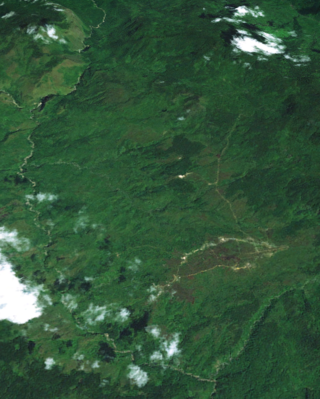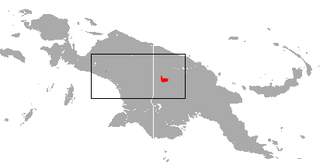
The Telefomin cuscus is a critically endangered possum found on New Guinea.

Oksapmin is a Trans–New Guinea language spoken in Oksapmin Rural LLG, Telefomin District, Sandaun, Papua New Guinea. The two principal dialects are distinct enough to cause some problems with mutual intelligibility.

Phalanger is a genus of possums. Its members are found on New Guinea, the Maluku Islands, other nearby small islands, and Australia's Cape York Peninsula. They are marsupials of the family Phalangeridae, and are one of the four genera whose species are commonly referred to as cuscuses.
Atbasar Airport is an airport in Kazakhstan located 5 km (3.1 mi) north of Atbasar in the Akmola Region. The airport contains a small unpaved airstrip with a small loop taxiway feeding into a small parking area. There are two buildings onsite.

Telefomin is a station town on the border of Sandaun and Western Provinces in Papua New Guinea. The town started during the Second World War after Mick Leahy was assigned to engineer an airstrip in 1944 for the United States for use against the Imperial Japanese Army forces based in New Guinea.

The Telefomin roundleaf bat is a species of bat in the family Hipposideridae. It is found in West Papua (Indonesia) and Papua New Guinea.
Peter Iwei is a Papua New Guinea politician. He was a member of the National Parliament of Papua New Guinea from 2007 to 2012, representing the electorate of Telefomin Open.
Telefol, Telefomin, or Telefolmin may refer to:
The Urapmin people are an ethnic group numbering about 375 people in the Telefomin District of the West Sepik Province of Papua New Guinea. One of the Min peoples who inhabit this area, the Urapmin share the common Min practices of hunter-gatherer subsistence, taro cultivation, and formerly, an elaborate secret cult available only to initiated men.
Mian is an Ok language spoken in the Telefomin district of the Sandaun province in Papua New Guinea by the Mian people. It has some 3,500 speakers spread across two dialects: West Mian, with approximately 1,000 speakers in around Yapsiei, and East Mian, with approximately 2,500 speakers in and around Timeilmin, Temsakmin, Sokamin, Gubil, Fiak and Hotmin.
The Mian people (Mianmin) are a people living in the Telefomin district of the Sandaun province in Papua New Guinea. The number of Mian is 3,500, based on the number of speakers of their language, Mian.
Telefomin District is a district of Sandaun Province of Papua New Guinea. Its capital is Telefomin. Its inhabitants include the Mountain Ok people, a cultural group with numerous sub-groups including the Telefol, the Urapmin, and the Wopkaimin. The Oksapmin also live in this district. Notable ethnographic research by Geoffrey B. Saxe at UC Berkeley has documented the encounter between pre-contact uses of number and its cultural evolution under conditions of monetization and exposure to schooling and the formal economy among the Oksapmin.
La Vallée infernale is the first novel in the Bob Morane series, written by the Belgian novelist Henri Vernes. It was first published in 1953.

The Sepik is the longest river on the island of New Guinea, and the second largest in Oceania by discharge volume after the Fly River. The majority of the river flows through the Papua New Guinea (PNG) provinces of Sandaun and East Sepik, with a small section flowing through the Indonesian province of Papua.
Hewa, also known as Sisimin and Lagaip, is spoken by the Hewa people. It is a Sepik language of northern Papua New Guinea. It is spoken in Lagaip Rural LLG of Enga Province, and also in Hela Province and Telefomin Rural LLG of Sandaun Province.
Sanio, or more precisely Saniyo-Hiyewe, is a Sepik language of Tunap/Hunstein Rural LLG in East Sepik Province, northern Papua New Guinea. It is also spoken in Telefomin Rural LLG, Sandaun Province.
The Telefomin incident occurred in November 1953 in Papua New Guinea when two patrol officers and two policemen were killed.

The Papuan scrub robin or New Guinea scrub robin is a species of bird in the family Petroicidae. It was found to be genetically distinct from the northern scrub robin, with which it was formerly considered conspecific.
Telefomin Rural LLG is a local-level government (LLG) of Sandaun Province, Papua New Guinea. Mountain Ok languages are spoken in the LLG.








